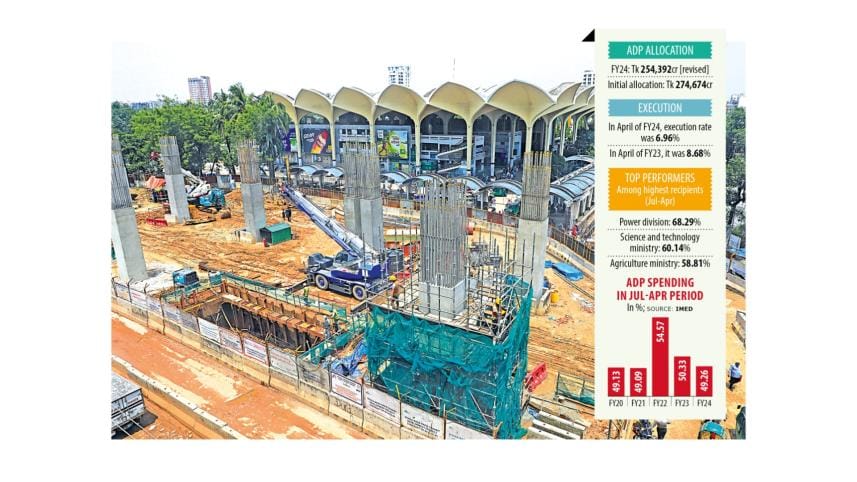ADP implementation slows to three-year low

Government spending under the Annual Development Programme (ADP) slowed to a three-year low in the first 10 months of the current fiscal year (FY) of 2023-24, with the implementation rate dropping to 49.26 percent.
According to data from the Implementation Monitoring and Evaluation Division (IMED), the government spent Tk 125,316 crore from its ADP allocation in the July-April period of FY24.
During the same period in FY23, development spending amounted to Tk 119,064 crore, representing an implementation rate of 50.33 percent.
Given the lower implementation rate, government agencies are likely to miss the revised target of spending Tk 254,391 crore on development projects by the end of the fiscal year in June.
The last two months of a fiscal year usually witness a higher trend of implementation and speedy fund disbursement.
But such practices raise questions about the quality of implementation, according to an analyst who spoke with The Daily Star yesterday.
"There is a trend of spending around 80 percent to 87 percent of the ADP allocation in the entire fiscal year," said Mustafa K Mujeri, executive director of the Institute for Inclusive Finance and Development (InM), an independent non-profit institution.
At present, less than half of the work has been done.
So, if implementing agencies want to keep pace with the normal trend, they have to spend over 35 percentage points of the ADP allocation in the next two months.
In April, the execution rate was only 6.96 percent of the total ADP allocation, down from 8.68 percent in the same month of the previous fiscal year, as per IMED data.
"It just shows hurriedness at the end. It may create an opportunity for corruption or to waste money," Mujeri said.
In some cases, many contractors try to implement projects by ignoring quality, which creates persistent problems for beneficiaries, he added.
An IMED official, seeking anonymity, said implementing agencies initially move slowly due to various factors, including land acquisition and import activities.
As a result, disbursement also slows, leading to time overruns, he said.
"When deadlines approach, they try to execute promptly," the official added.
Mujeri also underscored the need to implement projects under the health services division and education sector on a priority basis.
In the July-April period of this year, the health services division spent Tk 3,494 crore, or 37 percent of its total allocation.
That made it one of the worst performers in terms of implementation among the 15-highest ADP allocation recipients alongside the shipping ministry and the Prime Minister's Office.
"The trend of lower execution in health and education projects is alarming," Mujeri said.
"It has a far-reaching effect on public health and education as many low-income people can't afford their expenses," added Mujeri, also a former director general of the Bangladesh Institute of Development Studies.
In the last fiscal year, the IMED received over 350 proposals from ministries and divisions seeking to extend deadlines for various projects.
In this regard, Prime Minister Sheikh Hasina directed officials at a National Economic Council meeting on March 12 to ensure feasibility studies to improve the quality of implementation and speed up implementation of projects that would serve people immediately, according to the IMED official.

 For all latest news, follow The Daily Star's Google News channel.
For all latest news, follow The Daily Star's Google News channel.
Comments